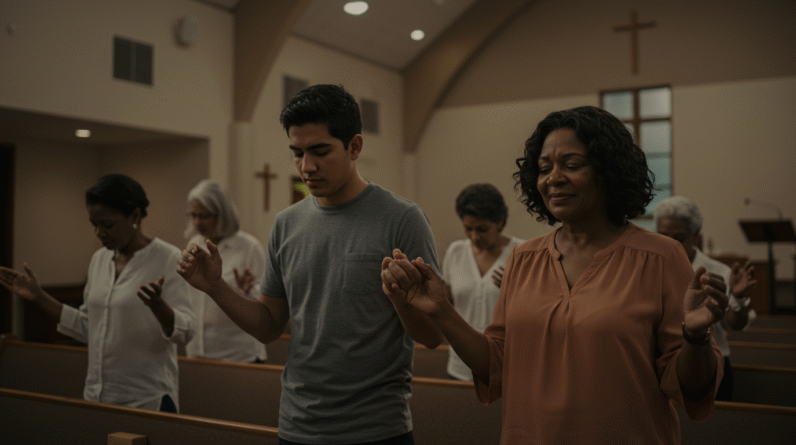Unity In The Body Of Christ: Why It Matters
Unity in the Church is not optional. If you follow Jesus, you’re part of a people bound together by the same Lord, the same gospel, and the same mission. You may feel frustrated when you see disunity — disputes over doctrine, personalities clashing, or cultural differences pulling people apart. But understanding why unity matters and how it’s rooted in Scripture gives you both a theological foundation and practical steps to pursue it in your local body.
In this article, you’ll explore biblical passages, real-life implications, obstacles that get in the way, and practical actions you can take to build healthier relationships in the Body of Christ. I’ll reference scripture from reputable sources so you can read the verses in context. Throughout, I’ll use the phrase Unity in the Church intentionally: it’s a focus that helps you see how the gospel shapes the way you interact with other believers every day.
What unity means for you and your church
Unity in the Church is not sameness. It doesn’t require you to give up your convictions, your personality, or your cultural identity. Instead, unity means living together in a way that reflects the unity of the triune God and the reconciling work of Christ. You’re united around the essentials of the faith — the gospel, Christ’s lordship, and the mission to make disciples — while allowing for diversity in non-essential matters. This balance keeps the church both honest and hospitable.
Unity also means mutual dependence. The Bible pictures the church as a body, with many members contributing different gifts and roles. You are necessary. If you withdraw or insist on your own way, the whole body is weakened. When you lean into shared worship, service, and mutual care, the Body of Christ becomes a stronger witness to the world.
The biblical foundation for unity
Jesus prayed for your unity
Jesus prayed specifically for the unity of his followers in the high-priestly prayer: “May they be one.” His prayer shows that unity is central to God’s plan and not merely a human project. When you see Christians divided, remember that Jesus prayed for you to be unified so that the world would believe in him.
Read the prayer here: John 17:20-23.
Paul’s vision: one body, many parts
Paul repeatedly explains that the church is one body made up of different members. He wants you to see your role within a larger whole. That means your gifts, your weaknesses, and your circumstances matter because they contribute to the health of the whole body. Unity is built by appreciating the variety God has given and by using your gifts to serve others.
See the full passage: 1 Corinthians 12:12-27.
Unity as a calling in Ephesians
Paul calls you to live a life worthy of the calling you’ve received — a calling that includes being humble, gentle, patient, and bearing with one another in love. He lists the pillars of unity: one body, one Spirit, one hope, one Lord, one faith, one baptism, one God and Father of all. This isn’t poetic padding; it’s the theological backbone for Unity in the Church. When you embody these virtues, unity becomes a spiritual practice rooted in the gospel.
Read it here: Ephesians 4:1-6.
Unity flows from family metaphors
Paul also uses the image of family to describe how you relate to other believers. You’re not only teammates; you’re brothers and sisters, bound by spiritual kinship. Family implies care, correction, forgiveness, and commitment — not just shared interests. That familial language reshapes how you think about disagreements: they’re not merely differences of opinion but relational issues that require love and grace.
See the passage: Romans 12:4-5.
Why unity matters for your witness
Unity is a testimony to the world
Jesus ties your unity directly to the mission: when you’re united, the world knows that the Father sent the Son. Unity becomes evangelistic. It demonstrates a different way of living — a community bound by love rather than by tribal loyalties or convenience. If you want your church to point people to Christ, unity is not optional; it’s essential.
Read Jesus’ own words: John 17:21.
Unity produces spiritual growth
When you’re committed to one another, you create the conditions for discipleship. Mature faith is formed through community — teaching, correction, encouragement, and accountability. Unity in the Church fosters an environment where spiritual gifts are exercised, where truth is taught in love, and where people are built up to maturity in Christ.
See the purpose in Ephesians: Ephesians 4:11-16.
Unity sustains care and service
Unity makes practical ministry possible. When believers are united, they share resources, bear one another’s burdens, and respond to needs with coordination rather than chaos. Acts shows a model of a community that cared for one another and grew together because they were devoted to fellowship, teaching, and prayer.
Look at the early church: Acts 2:42-47.
Why unity matters for individual believers
You flourish when the body flourishes
Your spiritual life is intertwined with the life of the Body. Isolation leaves you vulnerable to discouragement, pride, and distorted theology. Participation in a thriving community gives you encouragement, correction, accountability, and the opportunity to serve. When you give and receive love, you’re participating in the ongoing work of sanctification.
This theme appears throughout Scripture, like here: Colossians 3:14-15.
Unity shelters you in times of trial
When hardships come — and they will — unity provides tangible support. You need people who will pray with you, sit with you, and help you practically. The command to carry one another’s burdens isn’t abstract; it’s meant to be lived out in your relationships.
See the call to bear burdens: Galatians 6:2.
Unity refines your character
Pursuing unity challenges your pride and patience. It forces you to wrestle with forgiveness, humility, and the art of listening. Those are not easy virtues, but they shape you into the likeness of Christ. In that sense, unity has a personal sanctifying function as well as a corporate one.
Philippians captures this well: Philippians 2:1-4.
Common barriers to unity you’ll face
Pride and the desire to be right
People love being right. You may find it hard to step back and prioritize the relationship over being proven correct. When pride dictates your responses, unity frays. Recognizing this tendency in yourself is the first step toward humility.
James offers a piercing diagnosis of quarrels and selfish desires that fuel division: James 4:1-3.
Personality clashes and leadership struggles
Leaders and strong personalities can energize a church, but they can also create friction. When personal ambition or insecurity governs decisions, unity suffers. You can’t always control others’ actions, but you can control yours — choosing humility, clarity, and integrity.
Doctrinal convictions and legalism
There are essential truths worth defending. Yet legalism or triumphalism over nonessentials can fracture a congregation. The challenge is to distinguish gospel essentials from secondary issues and to graciously handle disagreements on the latter.
Paul addresses the principle of differing convictions in Romans: Romans 14:1-4.
Cultural and generational divides
Cultural background and generational experience shape how you see worship, ministry, and priorities. When those differences aren’t handled with sensitivity, Unity in the Church suffers. Learning to listen well and to contextualize without compromising the gospel helps bridge these gaps.
Sin left unaddressed
Unconfessed sin corrodes trust. A church that avoids confrontation or forgiveness will gradually lose its sense of intimacy and accountability. Dealing with sin biblically — honestly and lovingly — protects unity.
Jesus gives a process for addressing sin within the community: Matthew 18:15-17.

Practical steps you can take to cultivate unity
Pursue humility and prioritize relationships
You can start by asking: “Is this issue worth jeopardizing a relationship?” When in doubt, favor the relationship. Practically, that means you will listen more, speak less, and assume the best about others’ motives. Humility is the soil in which unity grows.
Paul’s exhortation is helpful: Philippians 2:1-4.
Make gospel central in conversations
Whenever a conflict arises, bring the gospel into the conversation. The gospel reminds you of both your sin and God’s mercy, which levels the playing field and frames disagreements in grace rather than accusation. When the gospel is the controlling narrative, you’re more likely to respond with forgiveness and patience.
Practice biblical reconciliation
If someone hurts you, follow Jesus’ steps for reconciliation: go privately, speak the truth in love, involve others if needed, and seek restoration. This process protects the dignity of all involved and moves toward reconciliation rather than gossip or escalation.
Follow Jesus’ guidance: Matthew 18:15-17.
Encourage regular, meaningful fellowship
Unity in the Church is strengthened when you commit to genuine fellowship — shared meals, small groups, prayer times, and service projects. These contexts allow you to know each other beyond surface-level interactions and to practice hospitality and care.
The early church modeled this: Acts 2:42-47.
Use your gifts for the common good
Identify your gifts and actively use them to serve. When you contribute, you communicate that you are invested in the health of the whole. That action builds mutual respect and reduces feelings of exploitation or passivity.
Paul’s teaching about gifts and service: 1 Corinthians 12:12-27.
Cultivate a culture of forgiveness and grace
Agree as a community to be quick to forgive, slow to anger, and eager to reconcile. Forgiveness doesn’t mean ignoring truth; it means letting go of the right to retaliation and moving toward restoration.
Colossians gives a succinct summary: Colossians 3:12-14.
Leadership and the work of unity
Leaders set the tone
Leadership carries responsibility. If you’re in a leadership position, your attitude toward unity will cascade through the congregation. Leaders promote unity by modeling humility, transparent decision-making, and consistent pastoral care. You help shape a culture where disagreement can exist without division.
Paul’s pastoral priorities include equipping the saints for ministry so the body can grow together: Ephesians 4:11-13.
Structures that support unity
Practical structures — small groups, conflict resolution pathways, clear governance, teaching plans — can prevent minor disputes from becoming major schisms. You’ll find it easier to maintain unity when there’s clarity about how decisions are made and how differences are handled.
Leaders should design systems that foster accountability, participation, and transparency, reflecting the relational nature of the church.
Unity and mission: they’re inseparable
Unity fuels effective mission
The Great Commission requires cooperation. You can’t effectively make disciples in isolation. Unity in the Church enables coordinated training, outreach, and care for the poor and marginalized. When you’re united, your witness is consistent and compelling.
Jesus’ call to mission: Matthew 28:18-20.
Unity amplifies your witness to spiritual and social needs
A unified church can respond to crises, advocate for justice, and serve the community with a coherent voice. Unity doesn’t erase diversity; it channels it toward a shared purpose so that differing strengths contribute to a common good.
The early church’s communal life was part of its evangelistic power: Acts 2:42-47.
Unity does not mean uniformity
You can disagree without dividing
You don’t have to view every theological or practical difference as a battle. Unity in the Church allows for robust debate on secondary issues while maintaining a common commitment to the essentials. You can hold convictions and still treat one another as brothers and sisters.
Paul shows that unity can coexist with diversity using the body metaphor: 1 Corinthians 12:12-27.
Distinguish essentials from nonessentials
It helps to be explicit about what is central to the gospel and what is secondary. Essentials include the person and work of Christ, justification by faith, and the authority of Scripture. Secondary matters — worship style, polity, cultural expressions — can vary without nullifying communion.
Galatians reminds you what binds you together beyond cultural markers: Galatians 3:28.
Handling theological differences with grace
Engage with humility and curiosity
When you encounter theological differences, ask questions rather than issuing judgments. Curious engagement opens the possibility for mutual learning and mutual correction. You’ll find that many disagreements diminish when people feel heard and respected.
Learn the art of temporary charity
Sometimes you may need to grant temporary charity: agreeing to disagree on a nonessential while continuing to work together. This is not dishonesty; it’s a strategic commitment to the unity of the gospel mission.
Romans offers a perspective on bearing with weaker consciences: Romans 14:1-4.
Steps to restore unity when it’s broken
Start with prayer and confession
Begin in humility before God. Pray for wisdom, confess where you’ve contributed to the breach, and ask God to soften hearts. Spiritual unity begins with divine grace and your willing cooperation.
The habit of confessing and praying is woven throughout Scripture as a path to restoration.
Follow biblical reconciliation steps
Use Matthew 18’s process: go privately, speak the truth with gentleness, involve impartial witnesses if needed, and bring matters before the church as a last resort. This approach helps maintain dignity and intentionally seeks restoration.
Matthew’s guidance: Matthew 18:15-17.
Seek mediation when necessary
If direct attempts fail, bring in trusted, godly mediators who can speak truth without taking sides. Mediation can break stalemates and provide a fresh perspective.
Commit to long-term rebuilding
Rebuilding trust takes time. You’ll need repeated acts of kindness, clear communication, and consistent boundaries. Celebrate small victories and keep returning to shared gospel commitments.
Hebrews encourages you to spur one another on toward love and good deeds — a practical rhythm for restoration: Hebrews 10:24-25.
The spiritual disciplines that foster unity
Prayer for one another and the church
When you pray with and for fellow believers, you cultivate empathy and spiritual solidarity. Prayer aligns your heart with God’s priorities and softens your instinct to control or judge.
Jesus modeled this in his prayer for unity: John 17:20-23.
Regular worship and shared sacraments
Gathering together for the Word and sacraments reinforces the theological reasons for unity. Shared worship reminds you of common identity and mission and gives regular opportunities to forgive, serve, and celebrate together.
Paul emphasizes the central practices that shape community life in his letters.
Study Scripture together
Shared Bible study creates a common language and a mutual anchor in truth. When you wrestle with Scripture together, you learn how to disagree lovingly and to let the Word correct you.
Serve side-by-side
Serving together — whether in the neighborhood, in cross-cultural missions, or within the church — builds camaraderie and a sense of shared purpose. Practical cooperation often heals relational wounds faster than debates ever could.
A final pastoral word for you
Unity in the Church is both a divine gift and a human responsibility. You cannot manufacture unity without God’s Spirit, but you can refuse it and sabotage the body by selfishness or indifference. Your commitment to humility, forgiveness, and gospel centrality matters more than you may think.
If you lead, use your influence to cultivate a culture that honors truth and practices grace. If you’re a member, use your voice and your life to build up the body. If you’re discouraged, hold on to Jesus’ prayer and the biblical vision for one people — diverse, committed, and loving.
Remember Psalm 133’s beautiful image of unity: it’s like oil poured on heads and dew on mountains — refreshing and sanctifying. Read it and let it sink in: Psalm 133:1.
Start small: practical first steps for you this week
Choose one of these small steps and act on it:
- Invite someone from another fellowship or generation to coffee and listen to their story.
- Apologize to someone you’ve allowed distance to grow with.
- Join a Bible study or small group and commit to attending for three months.
- Serve alongside people you don’t normally sit next to on Sunday.
Each small act is a practical seed of Unity in the Church. When you do them, you train your heart to value the Body over your preferences.
Conclusion
Unity in the Church is a gospel imperative. It’s rooted in Jesus’ prayer, modeled by the early church, and explained by Paul through the body metaphor. Unity is not uniformity; it allows diversity under the lordship of Christ and the centrality of the gospel. You’re called to pursue humility, practice forgiveness, and prioritize relationships so that the church can be an effective witness to the world and a place of spiritual growth and care.
Do not be naïve — unity will require sacrifice and steady discipline. But it is worth it: when the church is united, your witness is stronger, your spiritual life is deeper, and your community reflects the reconciling work of God.
Explore More
For further reading and encouragement, check out these posts:
👉 7 Bible Verses About Faith in Hard Times
👉 Job’s Faith: What We Can Learn From His Trials
👉 How To Trust God When Everything Falls Apart
👉 Why God Allows Suffering – A Biblical Perspective
👉 Faith Over Fear: How To Stand Strong In Uncertain Seasons
👉 How To Encourage Someone Struggling With Their Faith
👉 5 Prayers for Strength When You’re Feeling Weak

📘 Jesus and the Woman Caught in Adultery – Grace and Mercy Over Judgement
A powerful retelling of John 8:1-11. This book brings to life the depth of forgiveness, mercy, and God’s unwavering love.
👉 Check it now on Amazon
🌍 “Every great message deserves a home online.”
Don’t let your calling stay hidden. Start a Christian Blog/Website using Hostinger — with 99.9% uptime, free domain, and SSL, your voice can shine for God’s glory anytime, anywhere.
👉 Begin today. Try it RISK-FREE!
“Your body is God’s temple — care for it with purpose.”
Renew your energy and restore balance the natural way. Mitolyn helps support a healthy metabolism, giving you the vitality to live out God’s calling with strength and confidence.
🌿 Unlock Your Metabolic Power. Burn More Calories & Feel Great With Mitolyn.
👉 Start Today. Check Price Now.
As a ClickBank & Amazon Affiliate, I earn from qualifying purchases.
Acknowledgment: All Bible verses referenced in this article were accessed via Bible Gateway (or Bible Hub).
“Want to explore more? Check out our latest post on Why Jesus? and discover the life-changing truth of the Gospel!”






